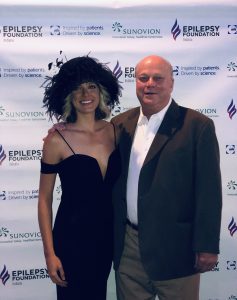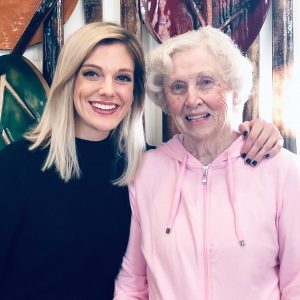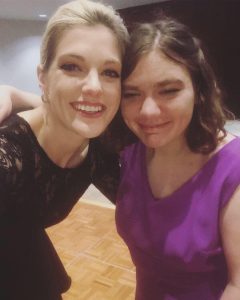This month is National Epilepsy Awareness Month. This annual event teaches people about epilepsy’s causes and symptoms. I, for one, had no idea that one in 26 people would be diagnosed with epilepsy at some point during their lifetime. What’s more, is that epilepsy is the fourth most common neurological disease but one of the least understood. During this month, many organizations join together to provide information to the public about this disease, building awareness across the country.
One of the reasons I wanted to write this important post was because of my new colleague JoJo Gentry. JoJo is a former Indy TV reporter who recently joined my company. She is young, energetic, professional, and talented, but she is one of the many living with epilepsy across the US. And she is not alone. There are more than twice as many people with epilepsy in the U.S. as the number of people with cerebral palsy (500,000), muscular dystrophy (250,000), multiple sclerosis (350,000), and cystic fibrosis (30,000) combined. Thus in an effort to get the word out about this disease, I asked JoJo a few questions so she could tell us more in her own words.
Tell us a little about yourself?
My name is JoJo Gentry. I am an eager young professional looking to do my part in making the world a better place. I am passionate about the communities I serve through my job as the Director of Communications for Bar Communications and my commitments as a Board Member for the Indiana Golf Foundation and Indiana Epilepsy Foundation.

Tell us about the epilepsy diagnosis?
I was diagnosed with juvenile myoclonic epilepsy at age 24 after experiencing my second grand mal seizure while eating lunch at a restaurant. That second seizure initiated my official diagnosis. I had my first grand mal seizure at age 20 after enduring a head injury. That first seizure lasted about five minutes and happened during my interview with former Carmel Mayor Jane Reiman. She saved my life, and we love staying in touch. However, neurologists to this day tell me they don’t know why I have epilepsy, which is a common and frustrating response.
Did you grow up with epilepsy?
I didn’t grow up with epilepsy but have managed it in my everyday life as a young adult. I battled high levels of fear and anxiety for about five years after my first seizure at age 20, especially while driving. Thankfully, a few years ago, I found a medication I take twice daily that has prevented seizures and other seizure-related experiences. I haven’t had a seizure in more than three years. Let’s hope that streak continues.

Tell us about adulthood with epilepsy?
I regained my confidence in my abilities to be independent after reaching my one-year seizure-free milestone when I was 26. I have flourished while focusing on maintaining a healthy lifestyle, which for me includes little to no alcohol, adequate sleep, and daily exercise.
What are your day-to-day concerns?
You cannot live in fear. Life is too short to stay inside. I conquered my fear of driving with epilepsy by spontaneously deciding to see a friend in St. Louis, which was a two-hour drive for me at the time. I gripped the steering wheel all the way there and back. But, I survived and had a great time. That experience reminds me constantly to live in the present.
What would you like others to know about epilepsy?
Seizures can happen at any time. If you believe someone is having a seizure, lay them on their side and track how long it lasts. Calmly tell them everything is okay when they wake up and stay with them until they determine their next steps, which should be resting at home with someone accompanying them. If a seizure lasts longer than 5 minutes, call 911.

What are the most common misconceptions?
It is very rare for someone to die from a seizure. Also, someone can have a seizure without losing consciousness. There are many types. If you believe someone is struggling, showing signs of jerking, staring into space, or losing motor skills, just ask if they are okay.
Why is National Epilepsy Month so important to you?
It’s always important to raise awareness and be open about your experiences so others can empathize and learn. The more people know, the less apprehensive they tend to be. Ultimately, people care about being there to help. Let them be there for you!
For more information on the Indiana Epilepsy Foundation, please click here.








